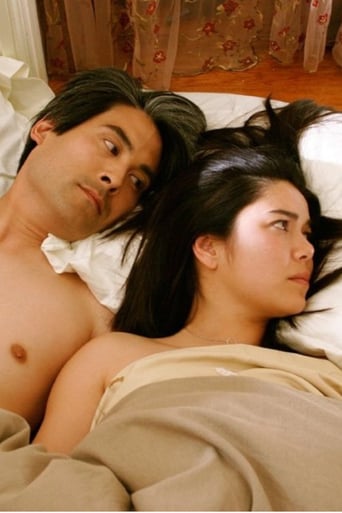Ibga
I recently saw Americanese at South By Southwest Film Festival and was a little disappointed. The acting is great, but the overall mood is just a little on the cheesy side. The music is a big problem. It's very "mood" heavy and a little ball-less. Kind of a Philip Glass mysteriousness but without any real substance. The effect was that I thought I was watching a soft core porn on Cinemax or something. Charlotte Sometimes, which I loved, had really great music by interesting artists. But the score for Americanese sounds like someone just improvised on an expensive synthesizer. I hope the soundtrack changes.
heyunzhi1983
I've see some comments on foreign websites but little here in China where Joan Chen has lots of fans!I really want to watch this art film and I'll appreciate you who can tell me when will this film be released in China, or any DVD copies in China? Thank you!And I hear Joan Chen has already featured in another movie in China directed by Jiang Wen, a famous Chinese director and actor. It has been told that the new film is also at the state of post production. But there is no data about it in here. Fan in China
janos451
Eric Byler, whose low-key, quietly fascinating film opened the S.F. International Asian American Film Festival March 16 in the Castro Theater, may well produce a great movie soon. "Americanese" is not it, but it's a huge step up from his already excellent "Charlotte Sometimes," and it is a work with gripping, unforgettable moments... even if they come rarely during two hours of what may feel like near-tedium to some.In an interesting, and perhaps significant, coincidence Byler's film appears at the same time with five other new works of Americana: Paul Weitz's "American Dreamz," Nicole Holofcener's "Friends with Money," Sidney Lumet's "Find Me Guilty," Robert Towne's "Ask the Dust," and Wim Wenders' "Don't Come Knocking." As Byler, the other directors are also responsible for their script. As in the case of "Americanese," these films deal with aspects of life in America, but Byler's focus is very different.Once again, Byler writes (taking Shawn Wong's novel, "American Knees," as his text) about what he knows, who he is: the lives of young (and now, middle aged) people of racially mixed parentage. From the 1915 "Birth of a Nation," Byler says in an essay, American film-makers "have typically approached race issues with stories that involve murder, mob violence, police brutality, and/or exaggerated melodrama." (A statement made even before the arrival of "Crash.") "Americanese" has none of that. It is a slow, thoughtful portrayal of private lives, against the background of many factors, including race. Byler is daring, risk-taking, difficult, in showing ordinary and yet complex characters in ordinary and yet extremely complicated relationships.The story's protagonist is a divorced, middle-aged history professor (Chris Tashima) with two romantic crises, being unable to let go of a younger ex-girlfriend (Allison Sie), or to take charge of a push-pull relationship with a beautiful, kind, and deeply-scarred and near-unstable Vietnamese refugee, played by Joan Chen.If three Chinese stars can take over "Geisha," why not have a fourth portray a Vietnamese as well? One's head may be injured by the scratching occasioned in contemplation of this mysterious shortage of talented and attractive actresses in Japan and Vietnam, but nothing can take away from Chen's performance. She is perfect, yielding and pushing away, bewitching and torturing the character played with appealing simplicity by Tashima.The slow, "naturalistic" development of "Americanese" culminates in a shocking surprise that belies all the apparent resolutions the film's characters achieve, and it does something more. As you leave the theater, the story continues within, and as you think about various sequels to it, suddenly, there is a realization how valid and deep that "surprise" ending was, how it explains some of what went on before. Depth: a hallmark of American cinema? I think not, but of Byler - more so.


